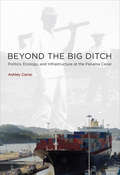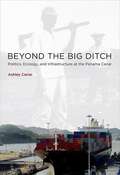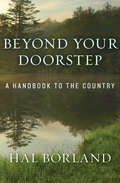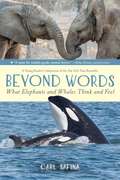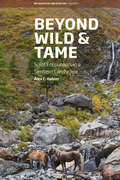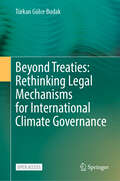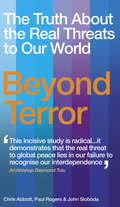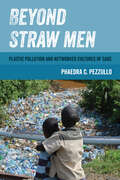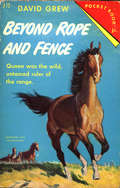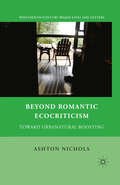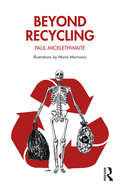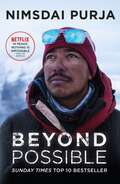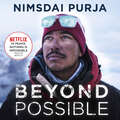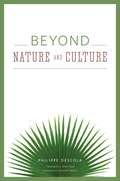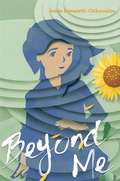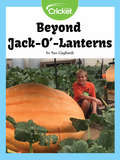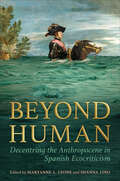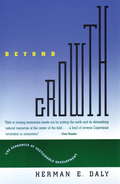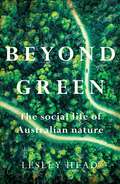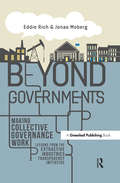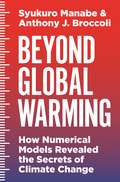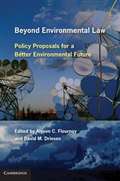- Table View
- List View
Beyond the Big Ditch: Politics, Ecology, and Infrastructure at the Panama Canal (Infrastructures)
by Ashley CarseA historical and ethnographic study of the conflict between global transportation and rural development as the two intersect at the Panama Canal. In this innovative book, Ashley Carse traces the water that flows into and out from the Panama Canal to explain how global shipping is entangled with Panama's cultural and physical landscapes. By following container ships as they travel downstream along maritime routes and tracing rivers upstream across the populated watershed that feeds the canal, he explores the politics of environmental management around a waterway that links faraway ports and markets to nearby farms, forests, cities, and rural communities. Carse draws on a wide range of ethnographic and archival material to show the social and ecological implications of transportation across Panama. The Canal moves ships over an aquatic staircase of locks that demand an enormous amount of fresh water from the surrounding region. Each passing ship drains 52 million gallons out to sea—a volume comparable to the daily water use of half a million Panamanians. Infrastructures like the Panama Canal, Carse argues, do not simply conquer nature; they rework ecologies in ways that serve specific political and economic priorities. Interweaving histories that range from the depopulation of the U.S. Canal Zone a century ago to road construction conflicts and water hyacinth invasions in canal waters, the book illuminates the human and nonhuman actors that have come together at the margins of the famous trade route. 2014 marks the 100th anniversary of the Panama Canal. Beyond the Big Ditch calls us to consider how infrastructures are materially embedded in place, producing environments with winners and losers.
Beyond the Big Ditch
by Ashley CarseIn this innovative book, Ashley Carse traces the water that flows into and out from the Panama Canal to explain how global shipping is entangled with Panama's cultural and physical landscapes. By following container ships as they travel downstream along maritime routes and tracing rivers upstream across the populated watershed that feeds the canal, he explores the politics of environmental management around a waterway that links faraway ports and markets to nearby farms, forests, cities, and rural communities. Carse draws on a wide range of ethnographic and archival material to show the social and ecological implications of transportation across Panama. The Canal moves ships over an aquatic staircase of locks that demand an enormous amount of fresh water from the surrounding region. Each passing ship drains 52 million gallons out to sea -- a volume comparable to the daily water use of half a million Panamanians. Infrastructures like the Panama Canal, Carse argues, do not simply conquer nature; they rework ecologies in ways that serve specific political and economic priorities. Interweaving histories that range from the depopulation of the U.S. Canal Zone a century ago to road construction conflicts and water hyacinth invasions in canal waters, the book illuminates the human and nonhuman actors that have come together at the margins of the famous trade route. 2014 marks the 100th anniversary of the Panama Canal. Beyond the Big Ditch calls us to consider how infrastructures are materially embedded in place, producing environments with winners and losers.
Beyond Your Doorstep: A Handbook to the Country
by Hal BorlandThe inspiring classic on the virtues of embracing the great outdoors from the national bestselling author of The Dog Who Came to Stay. Over the course of his career, Hal Borland wrote eight nature books and hundreds of &“outdoor editorials&” for the Sunday New York Times, extolling the virtues of the countryside. From his home on one hundred acres in rural Connecticut, Borland wrote of the natural wonders, both big and small, that surrounded him every day. Beyond Your Doorstep is his guide to venturing into the outdoors around your home, wherever it is, and discovering the countryside within reach. The beauty to be found in roadsides, meadows, woodlands, and bogs are explored in elegant prose. Borland takes up birds, animals, and plants—both edible and poisonous—and the miraculous ways in which they are threaded together throughout the natural world. Part introductory field guide and part incitement to exploration, Beyond Your Doorstep is a classic of nature writing and a must-read for anyone looking to renew his or her relationship to the outdoors.
Beyond Words: What Animals Think And Feel (Beyond Words #1)
by Carl SafinaA young reader’s adaptation of The New York Times bestsellerFollow researcher Carl Safina as he treks with a herd of elephants across the Kenyan landscape, then travel with him to the Pacific Northwest to track and monitor whales in their ocean home. Along the way, find out more about the interior lives of these giants of land and sea—how they play, how they fight, and how they communicate with one another, and sometimes with us, too.Weaving decades of field research with exciting new discoveries about the brain and featuring astonishing photographs taken by the author, Beyond Words: What Elephants and Whales Think and Feel gives readers an intimate and extraordinary look at what makes these animals different from us, but more important, what makes us all similar.
Beyond Wild and Tame: Soiot Encounters in a Sentient Landscape (Interspecies Encounters #2)
by Alex C. OehlerResponding to recent scholarship, this book examines animal domestication and offers a Soiot approach to animals and landscapes, which transcends the wild-tame dichotomy. Following herder-hunters of the Eastern Saian Mountains in southern Siberia, the author examines how Soiot and Tofa households embrace unpredictability, recognize sentience, and encourage autonomy in all their relations with animals, spirits, and land features. It is an ethnography intended to help us reinvent our relations with the earth in unpredictable times.
Beyond Wild and Tame: Soiot Encounters in a Sentient Landscape (Interspecies Encounters #2)
by Alex OehlerResponding to recent scholarship, this book examines animal domestication and offers a Soiot approach to animals and landscapes, which transcends the wild-tame dichotomy. Following herder-hunters of the Eastern Saian Mountains in southern Siberia, the author examines how Soiot and Tofa households embrace unpredictability, recognize sentience, and encourage autonomy in all their relations with animals, spirits, and land features. It is an ethnography intended to help us reinvent our relations with the earth in unpredictable times.
Beyond Treaties: Rethinking Legal Mechanisms for International Climate Governance
by Türkan Gülce BudakThis open access book examines the implications of the shift towards minilateralism for international climate law, analysing how climate-related trade measures and Paris Agreement compatible platforms may enhance global climate governance. The landscape of international climate change law is evolving from a traditional consensus-based treaty model, characterized by comprehensive yet often slow-moving agreements, toward a more pragmatic approach known as minilateralism. In this emerging paradigm, smaller groups of countries negotiate and implement trade measures aimed at mitigating climate impacts. An exemplary case is the European Green Deal, which introduces climate-related trade measures as a key instrument for achieving sustainability goals within and beyond Europe. Additionally, countries are exploring minilateral cooperation platforms within the Paris Agreement framework to further their climate objectives. The central questions to be addressed in this book are twofold. First, how can the design of the minilateral schemes comply with the Paris Agreement&’s international cooperation, common but differentiated responsibilities and respective capacities, and market-based mechanisms principles? Second, to what extent does the climate-related trade measures conform with the WTO regime, particularly with the non-discrimination principles of the trade law, namely most favoured nation and national treatment?
Beyond Terror: The Truth About the Real Threats to Our World
by Paul Rogers Chris Abbott John SlobodaIs international terrorism really the single greatest threat to world security?Since the 9/11 attacks, many Western governments assume terrorism to be the greatest threat we face. In response, their dangerous policies attempt to maintain control and keep the status quo by using overwhelming military force. This important book shows why this approach has been such a failure, and how it distracts us from other, much greater, threats of climate change, competition over resources, marginalisation of the majority of the world and global militarisation.Unless urgent, coordinated action is taken in the next 5-10 years on all these issues it will be almost imossible to avoid the earth becoming a highly unstable place by the middle years of this century. Beyond Terror offers an alternative path for politicians, journalists and concerned citizens alike.
Beyond Straw Men: Plastic Pollution and Networked Cultures of Care (Environmental Communication, Power, and Culture #4)
by Phaedra C. PezzulloAddressing plastics can feel overwhelming. Guilt, shame, anger, hurt, fear, dismissiveness, and despair abound. Beyond Straw Men moves beyond "hot take" or straw man fallacies by illustrating how affective counterpublics mobilized around plastics reveal broader stories about environmental justice and social change. Inspired by on- and offline organizing in the Global South and the Global South of the North, Phaedra C. Pezzullo engages public controversies and policies through analysis of hashtag activism, campaign materials, and podcast interviews with headline-making advocates in Bangladesh, Kenya, the United States, and Vietnam. She argues that plastics have become an articulator of crisis and an entry point into the contested environmental politics of carbon-heavy masculinity, carceral policies, planetary fatalism, eco-ableism, greenwashing, marine life endangerment, pollution colonialism, and waste imperialism. Attuned to plastic attachments, Beyond Straw Men illustrates how everyday people resist unsustainable patterns of the plastics-industrial complex through imperfect but impactful networked cultures of care.
Beyond Smoke and Mirrors
by Burton RichterGlobal climate change is one of the most important issues humanity faces today. This book assesses the sensible, senseless and biased proposals for averting the potentially disastrous consequences of global warming, allowing the reader to draw their own conclusions on switching to more sustainable energy provision. Burton Richter is a Nobel Prize-winning scientist who has served on many US and international review committees on climate change and energy issues. He provides a concise overview of our knowledge and uncertainties within climate change science, discusses current energy demand and supply patterns, and the energy options available to cut emissions of greenhouse gases. Written in non-technical language, this book presents a balanced view of options for moving from our heavy reliance on fossil fuels into a much more sustainable energy system, and is accessible to a wide range of readers without scientific backgrounds - students, policymakers, and the concerned citizen.
Beyond Rope and Fence (Famous Horse Stories)
by David GrewA black-maned buckskin like her mother, Queen was born on the open prairie, and early learned to fear the very sight and smell of men. As she grew to maturity, Queen became a wise and crafty leader of the wild band, leading it north whenever she saw men on the horizon. Caught at last, and apparently tamed, Queen waited only the chance to rejoin her mate and the herd on the free, open ranges she loved.
Beyond Romantic Ecocriticism: Toward Urbanatural Roosting (Nineteenth-Century Major Lives and Letters)
by Ashton NicholsNichols chronicles the Enlightenment view of 'Nature' as static and separate from humans as it moved towards the Romantic 'nature' characterized by dynamic links among all living things. Engaging Romantic and Victorian thinkers, as well as contemporary scholarship, he draws new conclusions about 21st-century ideas of nature.
Beyond Recycling
by Paul MicklethwaiteBeyond Recycling critically explores unasked questions around recycling and its prominent position in contemporary thinking about sustainability. It examines and challenges assumptions about why we appear to have so wholeheartedly committed to recycling as a cultural project. Recycling has become a commonplace notion and widespread practice. Yet its social, cultural and even environmental value has not been considered carefully enough. This book considers recycling as a contemporary cultural idea related to – but not wholly defied by – our response to material waste. It seeks to reclaim recycling from the environmentalists and waste management specialists, to explore the role it plays in wider contemporary discourse. As we become increasingly satiated, and in many cases sickened, by the excesses of modern consumerism, we are rethinking our relationship with the physical stuff that fills our lives. Dissatisfied with empty materialism, we seek new ways to reuse our material culture. Recycling, turning something considered to be waste into something with renewed value, is our primary collective response to the problems arising from consumption; and it is ripe for critical examination. Beyond Recycling is a fascinating read for conscious consumers and students in the creative arts, design, cultural studies, sustainability and environmental studies.
Beyond Possible: The man and the mindset that summitted K2 in winter
by Nimsdai Purja'An inspirational study in leadership and a powerful testament to the human spirit at its very best.'- Mail on Sunday'If you're going to get one book this year get Beyond Possible.' - Ant Middleton'The energy of the book gives it pace and you whip through, rather as Purja nips up verticals... Whether or not you are a lover of the mountains, you will marvel at his tenacity, his fearlessness. No one can fail to be inspired by what he achieved.' - The Times'Not only does Nims have exceptional physical stamina, he's also a leader with great skills in financial management and logistics.' - Reinhold Messner, the first person to climb all fourteen highest mountains in the world'The magnitude of his achievement is astonishing.' Soldier Magazine'A Living Legend.' Trail Magazine***In Beyond Possible Nimdai Purja tells the story of his life before his recent epic achievement of leading the team that scaled K2 in winter. He reveals how leadership, a willingness to learn, integrity and collaboration are essential qualities behind the world's greatest mountaineering feats. Nimsdai is the first man ever to summit all 8000m 'Death Zone' peaks in less than 7 months, and this book reveals the man behind the climbs - how his early life in Nepal and Special Forces training made him the person to go beyond possible...
Beyond Possible: The man and the mindset that summitted K2 in winter
by Nimsdai Purja'An inspirational study in leadership and a powerful testament to the human spirit at its very best.' - Mail on Sunday'If you're going to get one book this year get Beyond Possible.' - Ant Middleton'The energy of the book gives it pace and you whip through, rather as Purja nips up verticals... Whether or not you are a lover of the mountains, you will marvel at his tenacity, his fearlessness. No one can fail to be inspired by what he achieved.' - The Times'Not only does Nims have exceptional physical stamina, he's also a leader with great skills in financial management and logistics.' - Reinhold Messner, the first person to climb all fourteen highest mountains in the world'The magnitude of his achievement is astonishing.' Soldier Magazine'A Living Legend.' Trail Magazine***In Beyond Possible Nimdai Purja tells the story of his life before his recent epic achievement of leading the team that scaled K2 in winter. He reveals how leadership, a willingness to learn, integrity and collaboration are essential qualities behind the world's greatest mountaineering feats. Nimsdai is the first man ever to summit all 8000m 'Death Zone' peaks in less than 7 months, and this book reveals the man behind the climbs - how his early life in Nepal and Special Forces training made him the person to go beyond possible...
Beyond Possible: '14 Peaks: Nothing is Impossible' Now On Netflix
by Nimsdai PurjaAn SBS Gurkha soldier's account of how his tough Nepali upbringing and the lessons learned in his army life enabled his record-breaking conquest of all 14 of the world's 8,000m peaks in under 7 months.What happens when ambition meets limitless imagination? Enter Project Possible: a seemingly unreachable goal to climb all fourteen "death zone" mountains in record time. The previous record was seven years, ten months and six days. I did it in six months.This is the inside story of my incredible adventure. As a kid in Nepal, barefoot in the mountains, I developed the resilience I needed to later join the Gurkhas, one of the most fearless forces in the British Army. Then in the Special Boat Service I served in some of the world's most dangerous warzones.But my next challenge was even more of a test.In Beyond Possible I'll reveal how I conquered the world's most dangerous peaks, breaking several world records in the process. With my elite training, I was able to adapt quickly to the lethal conditions, rarely phased by the lung-burning temperatures or brutal winds. Fear became irrelevant because I had belief. In the death zone, I came alive. But even after facing countless challenges, right at the peak of my achievements, my world fell apart when my mother was hospitalized.But I survived and ultimately conquered the most deadly and hostile mountains on the planet. Beyond Possible is my story.(P)2020 Hodder & Stoughton Limited
Beyond Nature and Culture
by Philippe DescolaPhilippe Descola has become one of the most important anthropologists working today, and Beyond Nature and Culture has been a major influence in European intellectual life since its French publication in 2005. Here, finally, it is brought to English-language readers. At its heart is a question central to both anthropology and philosophy: what is the relationship between nature and culture? Culture--as a collective human making, of art, language, and so forth--is often seen as essentially different from nature, which is portrayed as a collective of the nonhuman world, of plants, animals, geology, and natural forces. Descola shows this essential difference to be, however, not only a specifically Western notion, but also a very recent one. Drawing on ethnographic examples from around the world and theoretical understandings from cognitive science, structural analysis, and phenomenology, he formulates a sophisticated new framework, the "four ontologies"-- animism, totemism, naturalism, and analogism--to account for all the ways we relate ourselves to nature. By thinking beyond nature and culture as a simple dichotomy, Descola offers nothing short of a fundamental reformulation by which anthropologists and philosophers can see the world afresh.
Beyond Me
by Annie Donwerth-ChikamatsuIn the spirit of A Place to Belong, this remarkable novel-in-verse examines the aftershocks of the earthquake and tsunami that devastated Japan in 2011 through the eyes of a young girl who learns that even the smallest kindness can make a difference.March 11, 2011 An earthquake shakes Japan to its core. A tsunami crashes into Japan&’s coast. Everything changes. In the aftermath of the natural disasters that have struck her country, eleven-year-old Maya is luckier than many. Her family didn&’t lose their home, their lives, or each other. But Maya still can&’t help feeling paralyzed with terror, and each aftershock that ripples out in the days that follow makes her fear all over again that her luck could change in an instant. As word of the devastation elsewhere grows increasingly grim—tens of thousands have perished—it all seems so huge, so irreparable. Already flinching at every rumble from the earth, Maya&’s overcome with a sense of helplessness and hopelessness. How can her country ever recover, and how could anything she does possibly make a difference? Before Maya can extend a hand to others, she must dig deep to find the hidden well of strength in herself in this sweeping, searing novel that shows even small acts can add something greater and help people and communities heal.
Beyond Jack-O'-Lanterns
by Sue GagliardiWhat kind of fruit could be a boat, a race car, and a work of art? An Atlantic Giant Pumpkin!
Beyond Human: Decentring the Anthropocene in Spanish Ecocriticism (Toronto Iberic #83)
by Maryanne L. Leone Shanna LinoChronicling sixteenth-century Spain to the present day, Beyond Human aims to decentre the human and acknowledge the material historicity of more-than-human nature. The book explores key questions relating to ecological equity, justice, and responsibility within and beyond Spain in the Anthropocene. Examining relations between Iberian cultural practices, historical developments, and ecological processes, Maryanne L. Leone, Shanna Lino, and the contributors to this volume reveal the structures that uphold and dismantle the non-human–human dichotomy and nature-culture divide. The book critiques works from the Golden Age to the twenty-first century in a wide range of genres, including comedia, royal treatises, agricultural reports, paintings, satirical essays, horror fiction and film, young adult and speculative literature, poetry, graphic novels, and television series. The authors contend that Spanish cultural studies must expose the material historicity that entangles today’s ecological crises and ecosocial injustices with previous, future, and contemporary entities. The book argues that this will require the simultaneous decentring of the human and of the Anthropocene as an ecocritical framework. By standardizing ecosocial analysis and widening avenues for ecopedagogical approaches, Beyond Human participates in the ecocentric transformation of Hispanic cultural studies.
Beyond Growth
by Herman E. Daly"Daly is turning economics inside out by putting the earth and its diminishing natural resources at the center of the field . . . a kind of reverse Copernican revolution in economics." --Utne Reader"Considered by most to be the dean of ecological economics, Herman E. Daly elegantly topples many shibboleths in Beyond Growth. Daly challenges the conventional notion that growth is always good, and he bucks environmentalist orthodoxy, arguing that the current focus on 'sustainable development' is misguided and that the phrase itself has become meaningless."--Mother Jones"In Beyond Growth, . . . [Daly] derides the concept of 'sustainable growth' as an oxymoron. . . . Calling Mr. Daly 'an unsung hero,' Robert Goodland, the World Bank's top environmental adviser, says, 'He has been a voice crying in the wilderness.'" --G. Pascal Zachary, The Wall Street Journal"A new book by that most far-seeing and heretical of economists, Herman Daly. For 25 years now, Daly has been thinking through a new economics that accounts for the wealth of nature, the value of community and the necessity for morality." --Donella H. Meadows, Los Angeles Times"For clarity of vision and ecological wisdom Herman Daly has no peer among contemporary economists. . . . Beyond Growth is essential reading."--David W. Orr, Oberlin College"There is no more basic ethical question than the one Herman Daly is asking." --Hal Kahn, The San Jose Mercury News"Daly's critiques of economic orthodoxy . . . deliver a powerful and much-needed jolt to conventional thinking." --Karen Pennar, Business WeekNamed one of a hundred "visionaries who could change your life" by the Utne Reader,Herman Daly is the recipient of many awards, including a Grawemeyer Award, the Heineken Prize for environmental science, and the "Alternative Nobel Prize," the Right Livelihood Award. He is professor at the University of Maryland's School of Public Affairs, and coauthor with John Cobb, Jr., of For the Common Good.
Beyond Green: The Social Life of Australian Nature
by Lesley HeadHow are we to think about nature and the environment? The idea of nature as it relates to culture, society and humans has always been in constant flux and highly contested. Lesley Head interrogates the ways the cultures of nature have operated in Australia across time, and how these ways of thinking and being limit our capacity to deal with the challenges of the climate change and biodiversity crises. Drawing on her life&’s work and lessons she has picked up along the way, Head suggests that it is up to us to attentively listen, the better to destabilise and subvert dominant narratives, and to imagine new possibilities. She believes we have the nous, resources and lessons from Indigenous, settler-descendant and immigrant cultures to reduce risk in the face of the unexpected and the unimaginable. In Beyond Green, the story of nature and people weaves research and personal experience through many different times and spaces, offering new ways of understanding. It is a richly creative engagement with the abundant possibilities and pleasure of nature as a place of regeneration that is as warned by the rawk of the crow as it is accompanied by the carolling of magpies.
Beyond Governments: Making Collective Governance Work - Lessons from the Extractive Industries Transparency Initiative
by Eddie Rich Jonas MobergIn a world characterized by globalization, governments increasingly find themselves unable to govern. Corruption is everywhere, natural resources are being exploited, the environment damaged, markets distorted, and the fight against poverty is often ineffective. Certain challenges cannot be addressed by governments alone. Increasingly, collective governance “beyond governments” is seen as part of the solution, with state and non-state actors working together. This book sets out a framework for those wishing to implement collective governance, involving civil society, companies and governments as key actors. Based on over eight years of running the most advanced example of collective governance at international level, the Head and Deputy Head of the Extractive Industries Transparency Initiative (EITI) outline the practicalities and pitfalls, and draw out the experience of the EITI as a case example. Beyond Governments tells a positive story of how this type of innovative governance can make real achievements, but also cautions against those who see collective governance as a silver bullet to solve development challenges. It provides practical guidance from a practitioner’s perspective and is essential reading for those in government, business and academia.
Beyond Global Warming: How Numerical Models Revealed the Secrets of Climate Change
by Syukuro Manabe Anthony J. BroccoliA definitive account of how we have come to understand the fundamental processes behind global warmingSyukuro Manabe is perhaps the leading pioneer of modern climate modeling. Beyond Global Warming is his compelling firsthand account of how the scientific community came to understand the human causes of climate change, and how numerical models using the world’s most powerful computers have been instrumental to these vital discoveries.Joined by atmospheric scientist Anthony Broccoli, Manabe shows how climate models have been used as virtual laboratories for examining the complex planetary interactions of atmosphere, ocean, and land. Manabe and Broccoli use these studies as the basis for a broader discussion of human-induced global warming—and what the future may hold for a warming planet. They tell the stories of early trailblazers such as Svante Arrhenius, the legendary Swedish scientist who created the first climate model of Earth more than a century ago, and they provide rare insights into Manabe’s own groundbreaking work over the past five decades. Expertly walking readers through key breakthroughs, they explain why increasing atmospheric carbon dioxide has caused temperatures to rise in the troposphere yet fall in the stratosphere, why the warming of the planet’s surface differs by hemisphere, why drought is becoming more frequent in arid regions despite the global increase in precipitation, and much more.Authoritative and illuminating, Beyond Global Warming is an invaluable insider’s look at some of today’s most cutting-edge Earth science, and a rare window into a brilliant scientific mind.
Beyond Environmental Law
by Alyson C. Flournoy David M. DriesenThis book offers a vision for the third generation of environmental law designed to enhance its ability to protect our environment. The book presents two core proposals, an Environmental Legacy Act to preserve a defined environmental legacy for future generations and an Environmental Competition Statute to spark movement to new clean technologies. The first proposal would require, for the first time, that the federal government define an environmental legacy that it must preserve for future generations. The second would establish a market competition to maximize environmental protection. The balance of the book provides complimentary proposals and analysis. The first generation of environmental law sought broad protection of health and the environment in a fairly fragmented way. The second sought to enhance environmental law's efficiency through cost-benefit analysis and market mechanisms. These proposals seek to create a broader, more creative approach to solving environmental problems.
